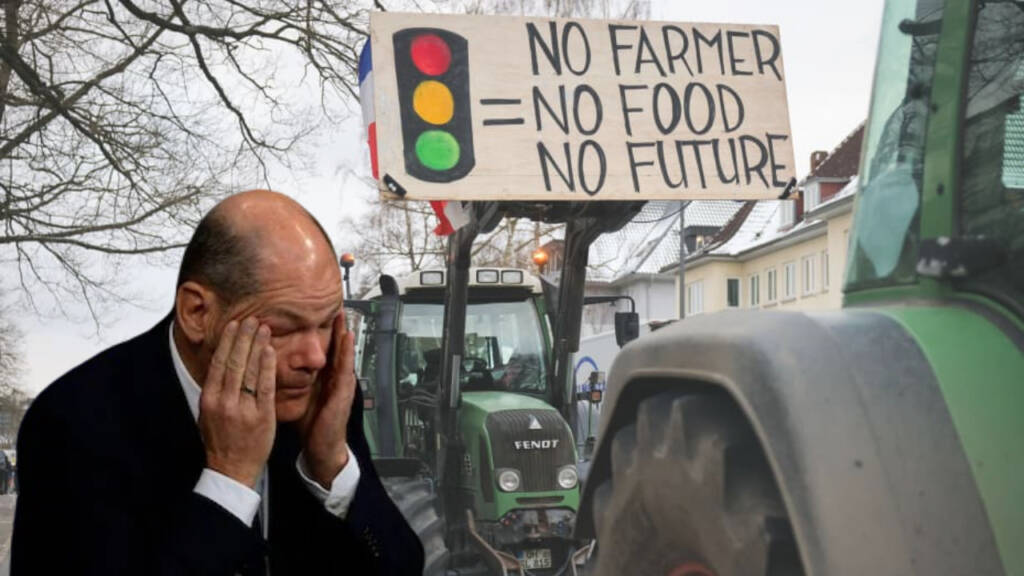German farmers have hit the streets in protest, rallying against Chancellor Olaf Scholz’s recent austerity measures. They’re fuming about slashed diesel subsidies and tax breaks for agricultural vehicles, claiming it’ll cripple their farms. Their gripe? The government’s lavish support for Ukraine while leaving local agriculture high and dry. Tractors roar through Berlin, convoys slow traffic, and blockades stir chaos. The burning question: Will Germany’s farms wither while foreign interests thrive?
German farmers are braving the brisk January temperatures to send a clear message to the government: they won’t shoulder the burden of the budget deficits crafted by authorities themselves.
Across Germany, farmers are uniting in a week-long protest against government austerity measures, fearing the imminent collapse of the agricultural sector due to lack of support. The uproar stems from the recent cuts to diesel subsidies and tax breaks for agricultural vehicles introduced by Chancellor Olaf Scholz in a broader plan aimed at tackling a multibillion-euro budget shortfall. This move has spurred thousands to converge on Berlin and other key cities, intending to disrupt motorways with blockades and mobilize slow-moving convoys.
Read More: Protesting farmers in Netherlands wave German flags—It is the endgame for the EU
Previously, a massive demonstration in Berlin compelled the government to backtrack partially on its announced measures. While concessions were made—such as preserving the preferential tax treatment of agricultural vehicles and postponing diesel tax cut reductions until 2026—protesters remain unsatisfied. They are now calling for an ‘Action Week’ of daily nationwide protests starting January 8, demanding a complete reversal of the proposed cuts.
Joachim Rukwied, head of the farmers association DBV, sees the partial cancellation as merely a starting point, vowing an unprecedented scale of protests against the government’s plans. Asserting the farmers’ uncompromising stance, Rukwied anticipates tens of thousands of tractors swarming rallies across Germany, demanding an unequivocal reversal of the tax hikes.
Clayton Morris from Redacted made a personal appearance on the scene, determined to uncover the farmers’ demands and probe the government’s response.
Join us on Telegram: https://t.me/tfiglobal
Engaging with a protester, Clayton delved into the soaring fuel and energy costs in Germany, prompting a pointed response. The protester highlighted Germany’s steep energy prices, particularly in the realm of electronic energy, noting the nation’s shutdown of nuclear plants last year. Expressing concerns about the consequences, he pondered whether there’d be sufficient energy this year to keep homes warm.
The sentiment among German farmers echoes a resounding “enough is enough.” Spiraling prices have become untenable, threatening their very way of life. These agricultural stalwarts contend that government policies are driving them toward ruin, declaring a decisive call for change.
One fiery protester rallied the crowd, blasting the government’s moves. “We’re standing united for our farmers, but what’s the government doing to us?” they thundered. Slamming the price hikes and money drain, they fumed about funds flowing overseas, especially to Ukraine. “Why not invest here in our own infrastructure?” they demanded. With fervor, they stressed the farmers’ pivotal role, warning that neglecting them could spell disaster, leaving no resources for vital needs—only for unnecessary conflicts.
Indeed, a whopping 65% surge in fuel costs has struck the farmers hard as they strive to sustain their businesses, ensuring food on tables and delivering produce to markets. Transportation is their lifeline, essential for ferrying goods. Clearly, these farmers are committed for the long haul, determined to weather these challenges.
Read More: From Green to Gray? Crippled Germany is going back to the Basics
In a thunderous uprising, farmers have descended upon the streets, a revolt against the Scholz administration’s choices. Angered by the government’s prioritization of aid to Ukraine over their own welfare, their resentment burns fiercely. The consequence? Their livelihoods are left in tatters as funds flow overseas, leaving them grappling with increased taxes as a bitter twist of fate. This clash paints a vivid picture of discord, spelling potential downfall for Scholz as the chasm widens between governmental decisions and the hardships endured by those toiling the land. If left unattended, Scholz’s days might be numbered.
Watch More:
